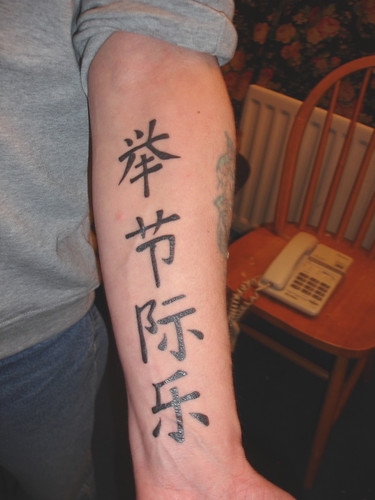
Especially the infamous "Asian Font" seen here, aka. English alphabet in gibberish Chinese.


















As these things go, I guess this one is not so bad. It appears to be the names of people in a family, with the family name バンタ [Banta] written horizontally and the given names ジム [Jim], アネット [Annette] and タナー [Tanner] written vertically under it.
The tattoo artist did make a mistake in that the final stroke ー in the name Tanner should be vertical instead of horizontal. This appears to be a common mistake that we also saw on Kimberley's tattoo.

The hiragana is clearly しゅうちんぼん [shuuchinbon], which is the Japanese reading of 袖珍本, meaning a "pocket-sized book" which was perhaps the size of today's paperback books, a handy size for carrying in the sleeves of kimono.





"Dragon" by Stephanie Campbell, Dragon FX, Kingsway, Edmonton, Alberta, Canada.Don't forget to check out Dragon FX's introduction movie, where it says:
"Whether you are getting a tattoo or piercing, you can be confident that our staff would go out of their way to serve your needs. After all, you are going to be wearing our work and we want you to be proud of it."
I think www.rankmytattoos.com is a gold mine of silly Chinese and Japanese tattoos. Check out this one:

http://www.rankmytattoos.com
You will notice that it says (from top to bottom):
銭
ぶく
あ
痛い
恋
At first, it looks like just random gibberish, until you realize that it was actually all tattooed in inverted order, bottom to top rather than top to bottom!
I think it was supposed to mean “Love Hurts” followed by “Easy Money."
The silly client or tattooist must have just looked in a Japanese dictionary and found the words “love” (恋), “hurt” (痛い) and “easy money” (あぶく銭, also written 泡銭) and then strung them all together, grammar be damned, breaking the text in strange places and, to top it all off, tattooed the characters in the wrong order.
All in all, it is a piece de resistance of ludicrous, terrible Japanese tattoo work, although the characters themselves are correct and written well.
Thanks for all the hard work as usual.
Alan
100% freehand work done by Adam Lunt of Eugene Oregon. About 3 hours, one smoke break, and a few days of the lovely stinging sensation that reminds me my newest piece of art is healing. I would like the Kanji rated, and how the color contrasts the black, since my skin is pale and a perfect palette. PEACEHowever, one commenter named "Bob" has summed up the whole thing in the following:
Well... This is supposed to read 善惡, "zen'aku," or "good and evil." There are mistakes in the way both of them are written, but the big problem with this tattoo is that the first character is upside-down. Sorry. And there's really no way to fix that. And the sadder thing is, you probably can't even sue. A skilled artist might be able to do a cover up....
"First Tattoo I Did On Someone Wo Is Neither Me Or Family And Doesnt Do It As A Joke
Good I Was Scared But The Guy Is Happy With It!
(Turnhout, Belgium)"


“Oh, this is really good one! The first three letters says ‘Red Sox’ (literately means ‘Red color sox’) which is kind of okay, but everybody knows Red Sox as Red Sox. You know what I mean? We pronounce and used the name of the team just like Bostonian, so this is kind of funny. On top of it, I think they try to say “Red Sox Fans” but, the last two letters literately means ‘an army corps,’ not ‘fan.’ I can see this sign was made by someone who speak Chinese, maybe? Who can not write [Japanese characters] Hiragana and katakana. When we use foreign words, we use Katakana. So the word ‘Red Sox’ or ‘fan’ should be all Katakana, not in Chinese letters. So this is my suspicious. Yeah, it is kind of No, No to call Japanese ‘An Army corps of red color sox?!’ Since [the Japanese were] Americans enemies long time ago!? I found this sign kind of funny! If Japanese see it, they can understand what they are trying to say. It is almost there, but not right Japanese.”


The main character gets the tattoo after his high school final exam. His buddies ask him what the chacaters mean. His answers "peace, love, bread" (yes, in this order!). When asked "why bread?", he explains that the tattooist had proposed "peace, love, freedom", but he just didn't like the shape of "freedom", and settled for "bread" instead, because it looked better.The correct translation for 愛和夢 is "love and dream" if they are read as one complete phrase.
Later in the movie, some girls ask him about the tattoo, and he gives the meaning as "peace, love, angel of death" (yes, in this order; no reference to bread).
Nowhere in the movie there is a clear indication that anybody was aware that anything specific was wrong with the tattoo. They only say, "luckily enough, nobody knows Japanese around here".











"Et il y a bien pire. Tian, jeune blogueur chinois aujourd’hui installé en Arizona, s’amuse justement à répertorier les tatouages les plus ridicules. Et il n’en manque pas. Sur son site (www.hanzismatter.com), qu’il alimente depuis deux ans, il a collectionné 400 perles. Parmi elles, mentionnons le tatouage d’une Américaine : « folle diarrhée ». Aïe !"
"There is worst. Tian, a young Chinese blogger, now living in Arizona is having fun documenting the most ridiculous tattoos. And there is no lack of it. On his site, on which he has been working for two years, he collected 400 gems. Amongst them, the tattoo of a young female American: "Crazy diarrhea". Ouch !"
